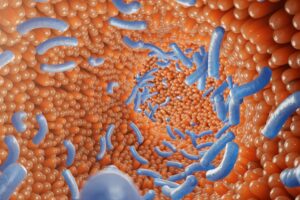Gastroenterology
Gastroenterology, Scientific research
Specific gut bacteria may drive some autoimmune conditions, including rheumatoid arthritis, inflammatory bowel disease, and multiple sclerosis. A new study published in Cell Host & Microbe claims.
Gastroenterology, Neuroscience
A new study published in the Journal of Proteomics is the first to profile the gut microbiota of autistic children, their relatives, and neurotypical children using a metaproteomic approach.
Endocrinology, Gastroenterology
Some gut and mouth bacteria produce enzymes that metabolize acarbose, a common antidiabetic drug, in ways that may reduce its therapeutic efficacy. A new study published in Nature claims.
Gastroenterology
Strategies to mitigate some of the collateral damages of antibiotic therapies are necessary. A new study published in Nature claims.
Gastroenterology, Immunology
Gut microbes seem to regulate the number and function of immune cells of central nervous system. A new study published in The EMBO Journal claims.
Gastroenterology
Aging produces changes in the microbiota of the small intestine. These changes are distinct from those caused by drugs or concomitant conditions and they could influence human health.
Gastroenterology, Oncology
Some individuals with advanced prostate cancer develop resistance to ADT, which promotes the expansion of specific gut bacteria that can synthesize androgens.
Gastroenterology, Ophthalmology
Gut microbiota-derived secondary bile acids might be key regulators in the pathogenesis of autoimmune uveitis. A new study published in Cell Reports claims.
Gastroenterology, Neuroscience
Differences in gut microbiota composition may make some people more susceptible to Konzo's disease. A new study published in Nature Communications claims.
Gastroenterology
Medications can accumulate in gut microbes, altering the activity of bacteria and potentially reducing the effectiveness of the drugs. A new study published in Nature claims.








